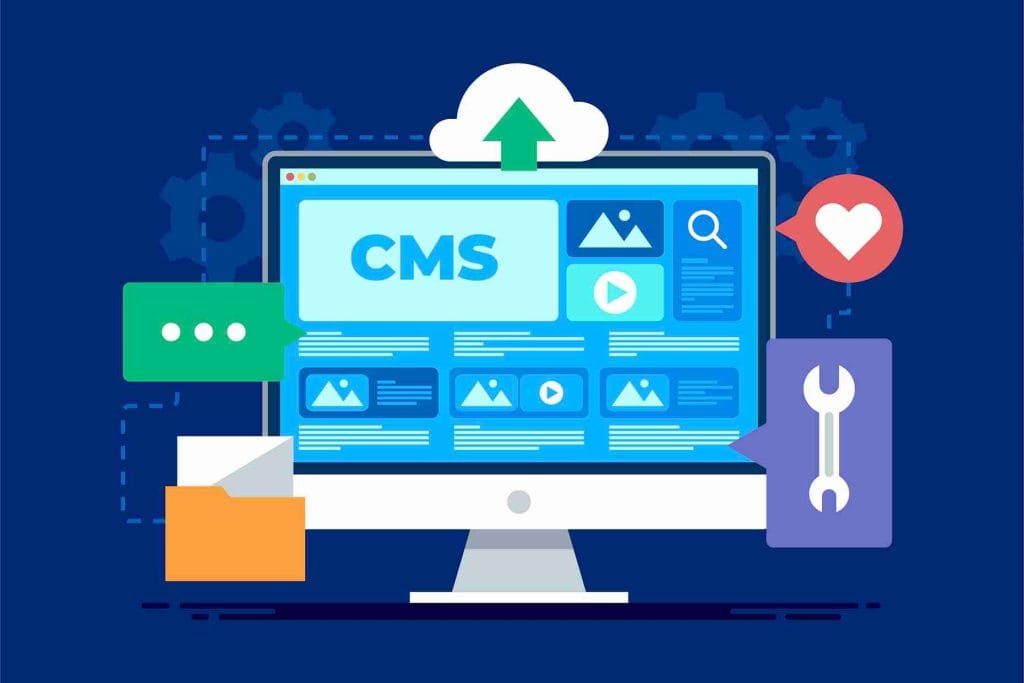Building a strong online presence starts with a robust website, and at the heart of nearly every great website lies a Content Management System (CMS). A CMS is the software that allows you to create, manage, and modify content on your website without needing to write code from scratch. But with a myriad of options available, from user-friendly drag-and-drop builders to powerful open-source platforms, choosing the right CMS for your website development can be a daunting task.
Are you struggling to decide which CMS is best for your business? Do you wonder about the pros and cons of top content management systems, and how each might impact your website’s functionality, scalability, and ease of management? This guide will cut through the confusion, providing expert advice to help you make an informed decision that aligns with your business goals. Click for the full guide and empower your online journey!
Table of Contents
ToggleKey Takeaways
Selecting the right CMS is a foundational strategic decision that impacts every aspect of your website’s operation, scalability, and long-term success.
- The Engine and Dashboard: A Content Management System (CMS) is the software that allows users to create, manage, and modify content on a website without writing code, acting as the operational engine and dashboard of the site. 2. Five Key Factors: The choice of CMS must be driven by five crucial considerations: Business Needs/Goals, Team’s Technical Proficiency, Budget (initial and ongoing), SEO Capabilities, and Security & Support.
- Fit for Purpose: The “best” CMS is subjective. WordPress offers maximum versatility, Shopify dominates specialized e-commerce, and Drupal is favored for large-scale, high-security enterprise needs.
- Trade-offs Exist: Open-source platforms (WordPress, Drupal) offer maximum flexibility but demand more active security maintenance. Proprietary builders (Wix, Squarespace) offer superior simplicity and built-in support but limit customization and lead to vendor lock-in.
- The Foundational Decision: Choosing the correct CMS dictates the site’s scalability, maintenance costs, and ability to adapt to future business requirements.
The Core Role of a CMS in Modern Web Development
Think of a CMS as the engine and dashboard of your website. It handles the underlying technical infrastructure, allowing you to focus on creating and organizing your content. This empowers businesses, marketers, and content creators to manage their digital presence efficiently, without constant reliance on developers for every update or change.
The right CMS can significantly impact:
- Ease of Use: How quickly and easily you can update content.
- Scalability: The platform’s ability to grow with your business.
- Security: How well your website is protected from threats.
- SEO Performance: How easily your site can be optimized for search engines.
- Cost: Initial setup and ongoing maintenance expenses.
Choosing wisely at the outset can save you time, money, and headaches down the line.
Choosing the Right CMS for Your Website Development: Key Considerations

Before diving into specific platforms, let’s look at the crucial factors that should influence your CMS decision.
1. Your Business Needs and Goals
Start with your “why” and “what.”
- Website Purpose: Are you building a blog, an e-commerce store, a corporate website, a portfolio, or a community forum? Different CMS platforms excel at different functions.
- Functionality Required: Do you need advanced e-commerce features, user registration, membership capabilities, multi-language support, or intricate integrations with other business tools (CRM, ERP)?
- Target Audience: Who are you trying to reach, and what kind of user experience do you want to provide?
- Scalability: Do you anticipate significant growth in content, traffic, or functionality in the future? Choose a CMS that can evolve with you.
2. Technical Proficiency and Team Expertise
Consider who will be managing the website daily.
- Technical Skill Level: Do you have an in-house development team, or will non-technical staff (marketers, content creators) be responsible for updates? Some CMS platforms are more beginner-friendly than others.
- Learning Curve: How much time are you willing to invest in learning a new system?
- Reliance on Developers: Do you want to minimize your dependence on developers for routine tasks?
3. Budget: Initial and Ongoing Costs
Website costs go beyond the initial build.
- Development Costs: The cost of building the website itself on your chosen CMS.
- Licensing Fees: Some commercial CMS platforms require recurring licenses.
- Hosting Costs: The cost of hosting your website’s files and database.
- Plugins/Extensions: Many platforms have free and premium plugins/themes, and premium ones can add up.
- Maintenance & Support: Costs for updates, security patches, troubleshooting, and professional support.
4. SEO Capabilities
Your CMS should be a strong ally in your search engine optimization efforts.
- Clean Code: Does the CMS generate clean, semantic HTML that search engines can easily crawl and understand?
- SEO Tools/Plugins: Does the platform offer built-in SEO features or robust plugins (like Yoast SEO for WordPress) to manage meta titles, descriptions, sitemaps, and more?
- Mobile-Friendliness: Does it inherently support responsive design or make it easy to create a mobile-friendly site?
- Site Speed: Does the CMS facilitate fast loading times, which are crucial for both SEO and user experience?
5. Security and Support
Protecting your website and having reliable help are paramount.
- Security Features: Does the CMS have built-in security measures, regular security updates, and a strong community or vendor dedicated to patching vulnerabilities?
- Community Support: For open-source platforms, a large and active community means more resources, forums, and unofficial support.
- Vendor Support: For commercial platforms, what level of official support is provided (email, phone, dedicated account manager)?
Also Read: Best CMS Solutions for Ecommerce Success
Top Content Management Systems: Pros and Cons

Let’s explore some of the most popular CMS options and their characteristics.
1. WordPress (Self-Hosted)
The undisputed market leader, powering over 43% of all websites.
- Pros:
- Unmatched Versatility: Can build anything from blogs to e-commerce (with WooCommerce) to complex corporate sites.
- Vast Plugin & Theme Ecosystem: Thousands of free and premium options for virtually any functionality or design.
- Excellent SEO Capabilities: Clean code, highly customizable for SEO with plugins.
- Large Community Support: Abundant tutorials, forums, and developers.
- Cost-Effective: Open-source software (free), only pay for hosting and premium add-ons if desired.
- Flexible: Full control over your website.
- Cons:
- Learning Curve: Can be steep for complete beginners managing hosting, updates, and security.
- Maintenance: Requires regular updates and security management (though many hosts offer managed WordPress).
- Performance: Can be slow if not properly optimized (too many plugins, poor hosting).
2. Shopify
The leading e-commerce platform for online stores.
- Pros:
- E-commerce Focused: Built specifically for online selling, with integrated payment gateways, inventory management, and shipping tools.
- User-Friendly: Very intuitive for setting up and managing an online store.
- Excellent Support: 24/7 customer support.
- Security & Hosting: Handles all hosting and security for you.
- Scalable: Can handle businesses from small startups to large enterprises.
- Cons:
- Transaction Fees: Charges additional transaction fees unless you use Shopify Payments.
- Limited Customization: Less flexible for non-e-commerce content or highly custom designs compared to WordPress.
- Monthly Fees: Subscription-based, which can add up.
3. Joomla!
A powerful and flexible open-source CMS, often seen as a middle ground between WordPress and Drupal.
- Pros:
- Strong Flexibility: Good for complex websites and web applications.
- Multilingual Support: Excellent built-in features for multi-language sites.
- Robust Framework: Offers strong features for user management and content organization.
- Cons:
- Steeper Learning Curve: More complex than WordPress for beginners.
- Smaller Ecosystem: Fewer extensions and themes compared to WordPress.
- Requires Technical Knowledge: Often needs a developer for advanced customization.
4. Drupal
Highly powerful and flexible, often used for enterprise-level websites and complex web applications.
- Pros:
- Exceptional Security: Known for its robust security features, making it a favorite for government and large organizations.
- Highly Scalable: Can handle extremely large websites and high traffic volumes.
- Powerful Customization: Unparalleled flexibility for complex data structures and custom functionalities.
- Cons:
- Steep Learning Curve: Requires significant technical expertise to build and manage.
- Higher Development Costs: Building and maintaining a Drupal site typically requires experienced developers, making it more expensive.
- Smaller Community: Compared to WordPress, the community is smaller, and resources might be less accessible for beginners.
5. Squarespace / Wix (Website Builders)
All-in-one website builders offering drag-and-drop simplicity.
- Pros:
- Extreme Ease of Use: Perfect for beginners with no coding knowledge.
- Beautiful Templates: Offer stunning, professionally designed templates.
- All-Inclusive: Hosting, security, and basic features are built-in.
- Affordable Entry Point: Simple subscription model.
- Cons:
- Limited Flexibility: Less control over code and advanced customization.
- Scalability Issues: May not be suitable for very large or complex websites with unique functional requirements.
- SEO Limitations: While they have basic SEO features, they offer less fine-grained control than open-source CMS platforms.
- Vendor Lock-in: Difficult to migrate your site away from the platform if you choose to.
The Verdict: Which CMS Is Right for You?
The “best” CMS isn’t universal; it’s the one that best fits your specific requirements.
- For Blogs & Versatility: WordPress remains the king due to its flexibility, vast ecosystem, and SEO capabilities, especially when combined with a good hosting provider.
- For E-commerce (Small to Medium): Shopify is hard to beat for its ease of use and integrated selling tools.
- For Complex Web Applications & High Security: Drupal is ideal if you have the technical resources and need enterprise-level features.
- For Simplicity & Design-Focused Small Sites: Squarespace or Wix are excellent choices if you prioritize ease of use and visual appeal over deep customization.
Actionable Advice: Don’t hesitate to try a free trial or demo of a few CMS platforms before committing. Test their content editing interfaces, check out their plugin/app stores, and assess how easy it is to achieve your core needs.
Conclusion: Your CMS Choice, Your Digital Future
Choosing the right CMS for your website development is a foundational decision that impacts every aspect of your online presence. It’s not just about picking a platform; it’s about selecting a digital partner that empowers your content, supports your growth, and simplifies your operational workflow.
By carefully considering your business needs, technical capabilities, budget, and future goals, you can confidently select the CMS that will serve as the springboard for your online success.
If the complexities of CMS selection and website development still feel overwhelming, remember you don’t have to navigate this journey alone. At RemoteForce, we specialize in comprehensive web and app development services, offering expert guidance from initial consultation to full website deployment.
Our team excels in working with leading CMS platforms like WordPress, ensuring your site is not only built on the right foundation but also designed to be highly functional, visually appealing, and optimized for search engine performance.
Beyond web and app development, RemoteForce also offers digital marketing, graphic design, secretarial, legal, and accounting services, providing a holistic suite of solutions to empower your business.
Ready to build a powerful website on the perfect CMS for your business? Contact RemoteForce today for expert advice and development services!
Frequently Asked Questions (FAQ)
1. What is the key difference between WordPress.com and WordPress.org?
- WordPress.com is a proprietary, hosted service (like Wix/Squarespace). It manages all hosting, security, and updates for you, but restricts customization and plugin use (unless you pay for high-tier plans).
- WordPress.org is the free, open-source software you install on your own web host. This gives you 100% control over the code, plugins, themes, and scalability, but requires you to manage all maintenance and security yourself.
2. What is “vendor lock-in” in the context of CMS selection?
Vendor lock-in occurs when a business is so heavily dependent on a proprietary platform (like Wix, Squarespace, or a closed commercial CMS) that switching to a different platform becomes prohibitively difficult or costly. This is often because the content and structure are not easily exportable or require extensive reformatting to be used elsewhere.
3. How does CMS security work for Open Source platforms?
Open-source platforms like WordPress and Drupal benefit from the eyes of a massive, global community constantly testing and reporting vulnerabilities. While this transparency is a strength, it also means that the site owner is responsible for installing regular security patches, keeping plugins updated, and adding security layers (like firewalls and backups).
4. Which type of CMS is best for building an Extranet or Intranet?
For building secure, user-role-heavy platforms like an extranet (for partners/clients) or an intranet (for internal staff), a highly flexible and permission-focused CMS is required. Drupal and Joomla! are traditionally excellent choices due to their robust built-in features for managing complex user roles, permissions, and private content access control.
- What Is Logo Design? A Complete Guide to Creating Memorable Brand Marks - February 2, 2026
- What Is Brand Identity? The Complete Guide to Building Recognition - February 2, 2026
- How Graphic Design Works: A Step-by-Step Process Guide - January 30, 2026



